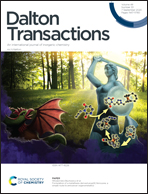Adjusting the lipid–water distribution coefficient of iridium(iii) complexes to enhance the cellular penetration and treatment efficacy to antagonize cisplatin resistance in cervical cancer†
Abstract
The effective design of metal complexes to manipulate their lipid–water distribution coefficient is an appealing strategy for improving their cellular penetration and treatment efficacy. Here, we conveniently synthesized three iridium (Ir) complexes with red fluorescence via the simple non-conjugate modification of the side arm of the ligand. Bio-evaluation revealed that upon adding non-conjugate selenium (Se) arene derivatives, the lipid–water distribution coefficient of Ir–Se was found to be suitable, not only decreasing the toxic side effects of complexes to normal cells, but also effectively improving their anticancer activity via enhancing their penetration into tumor cells. Moreover, mechanistic investigations demonstrated that Ir–Se entered R-HeLa cells through endocytosis, and triggered apoptosis via the down-regulation of the mitochondrial membrane potential and excessive production of singlet oxygen, thereby possessing a highly effective cytotoxicity to antagonize cisplatin resistance. Therefore, we developed a convenient strategy to derive functional metal complexes and revealed that the introduction of Se on the side arm of the ligand provided the complexes with the capacity to reverse multidrug resistance.



 Please wait while we load your content...
Please wait while we load your content...